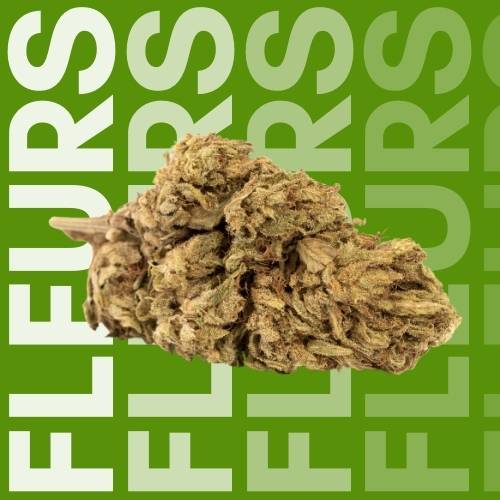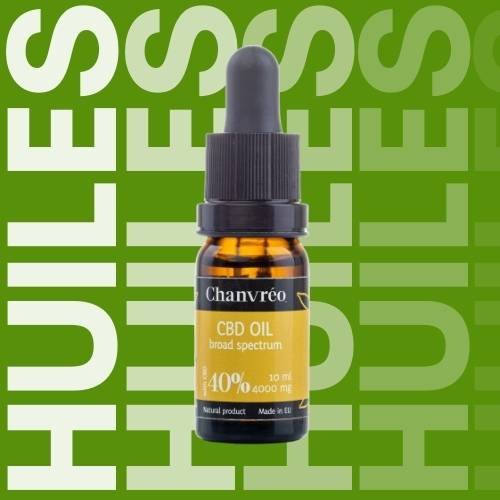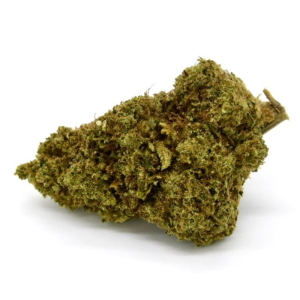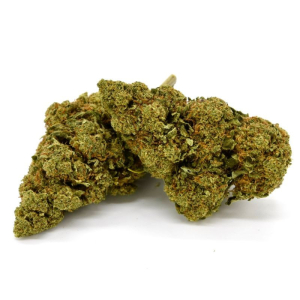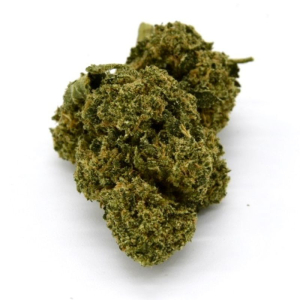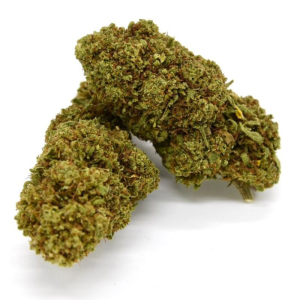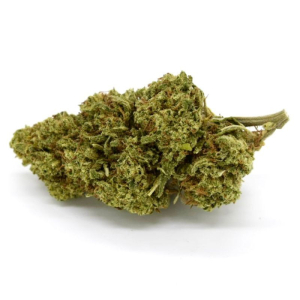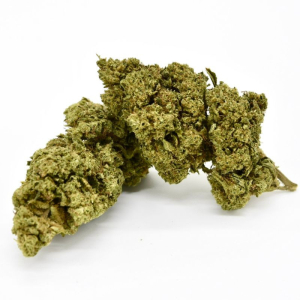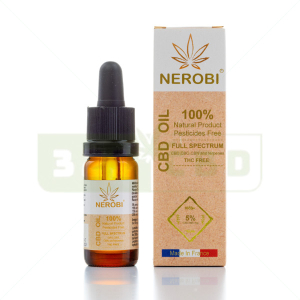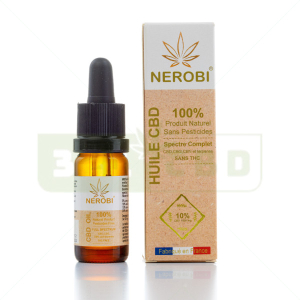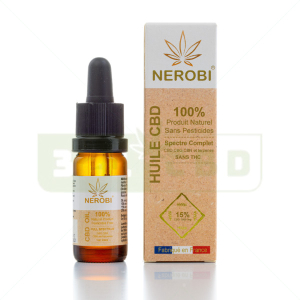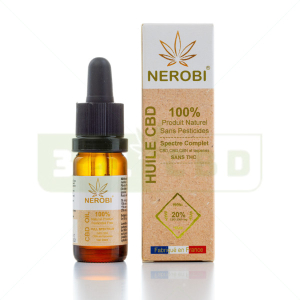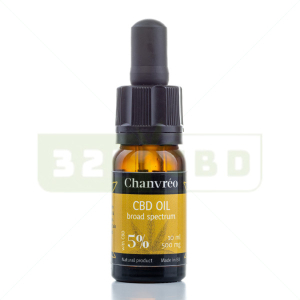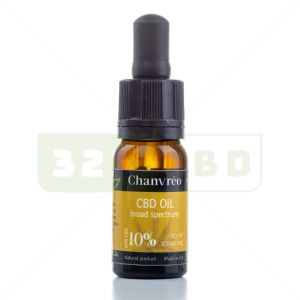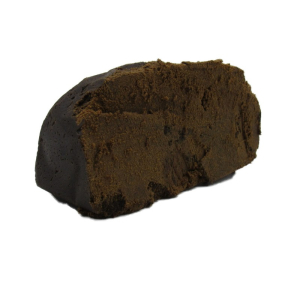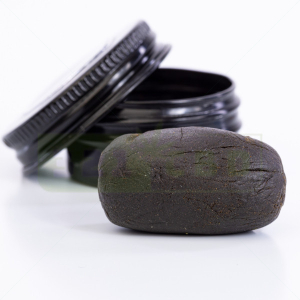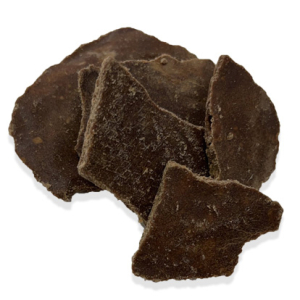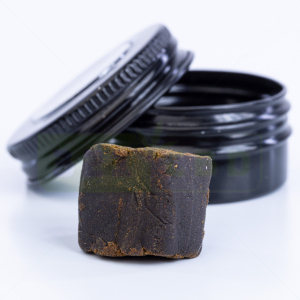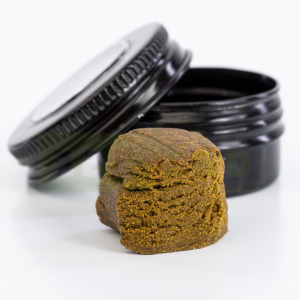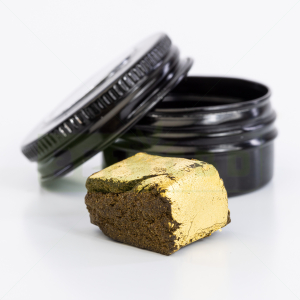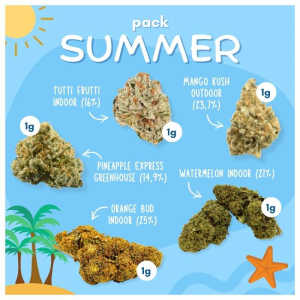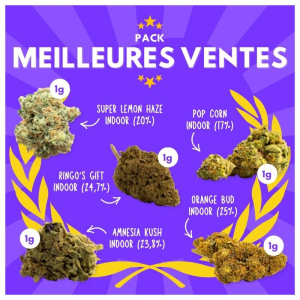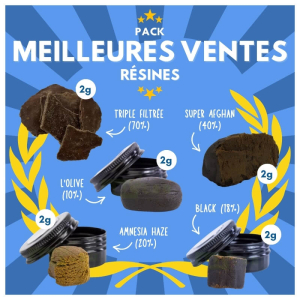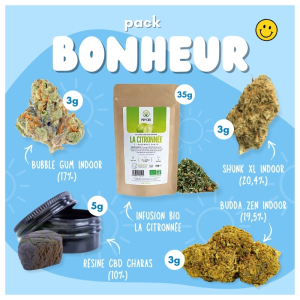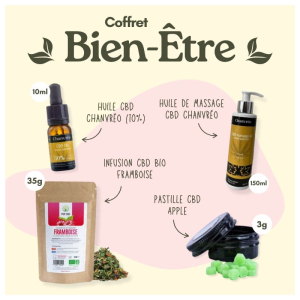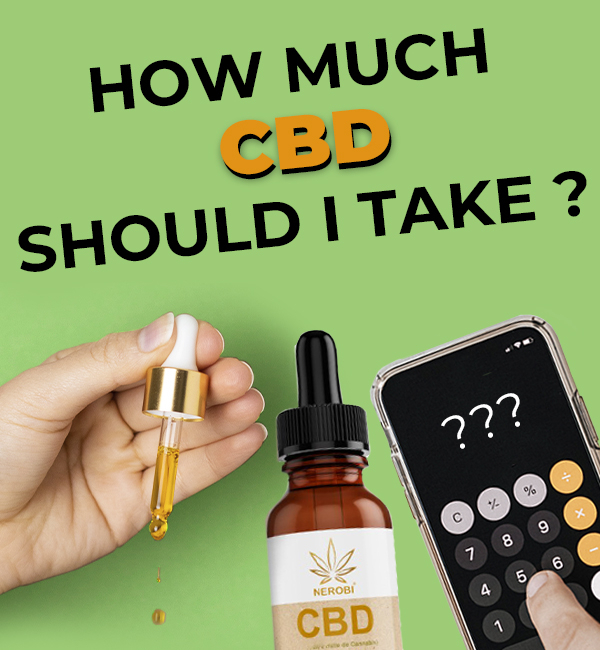Our range of powerful, inexpensive CBD flowers, in outdoor, indoor or greenhouse versions. Many varieties, varied flavors. Powerful effects, guaranteed relaxation.
Find our CBD oil Full Spectrum or Broad Spectrum. Range adapted to all types of effects sought, pain relief, sleep, stress reduction.
Our selection of powerful and cheap CBD resin or CBD shit. Relaxing effects guaranteed, perfect for vaping or ingestion. High CBD content.
Our selection of CBD Packs. Ideal for beginners wishing to try out a CBD experience or for anyone wishing to offer a wellness gift.
321CBD.COM - YOUR SITE FOR BUYING CBD PRODUCTS IN FRANCE
CBD flowers
Find our products at discounted prices!
CBD oils
CBD resins
CBD crystals
PARTNER OF YOUR DAILY WELL-BEING, 321CBD is the accomplice of your hedonistic pleasures and YOUR regular supplier of good CBD products!
PROMISE: ROYAL quality CBD products, rigorously selected from the best legal cannabis cultures in France, Italy, and Switzerland. Flowers, oils, resins, e-liquids, and other formats are 100% compliant with current legislation in France and Europe.
TO TEST AND DISCOVER YOUR FAVOURITE VARIETY WITH A QUIET MIND
YOUR CBD ADVISER: warm customer service, provided by a team of experts who give you relevant, personalised advice at every exchange. Which format? Which strain? What organoleptic properties? What dosage?
GET ALL THE ANSWERS TO YOUR QUESTIONS AND CHOOSE THE PRODUCT THAT WILL HELP YOU
YOUR BUDGET PRESERVED: 321CBD is the (REAL) best price guarantee, with an exceptional loyalty programme and regular promotions on bestsellers.
TO CONSUME THE BEST OF CBD WHILE PRESERVING YOUR PURCHASING POWER
YOUR DISCRETION ASSURED: You will be delivered in the form of anonymised, odourless, and hermetically sealed packages, away from prying eyes, within 48 hours, FREE OF CHARGE, with no minimum purchase required!
TO PRESERVE YOUR SECRET GARDEN
Let's unite in celebrating the numerous benefits of high-quality CBD and relishing the pleasures of hemp in full legality!
WE MAKE OUR CUSTOMERS HAPPY IN MANY COUNTRIES
- - France
- - Germany
- - Spain
- - Italy
- - Portugal
- - Poland
321CBD.COM LEADER IN LEGAL CANNABIS IN FRANCE
10 Advantages of Choosing 321CBD
CHALLETIC CUSTOMER SERVICE, which responds to you with a smile and lends an attentive ear to offer you a shopping experience REMARKABLE. It's simple: we're convinced that CBD goes hand in hand with conviviality. And we prove it, every day!
PERSONALISED EXPERTISE, at every exchange. Our CBD specialists advise you on formats, packaging, strains and organoleptic properties according to your objectives (sleep, stress, pain...) but also your taste preferences and your experience with legal hemp.
FAST DELIVERY (within 48 hours maximum), secure and above all free, with no minimum purchase, anywhere in mainland France, Germany and Austria. Receive good legal hemp products directly to your home, with complete peace of mind.
CBD WITH LESS THAN 0.3% THC may be perfectly legal... but we understand the need for discretion! That's why we deliver anonymised, odourless and hermetically sealed packages to you, away from prying eyes.
R ROYAL QUALITY CBD PRODUCTS, from the best hemp crops in France, Switzerland and Italy, to please purists and curious beginners alike!
The (REAL) BEST PRICE GUARANTEE... with the added bonus of 10% off your 1st order and 10% cashback ON ALL YOUR ORDERS. 321CBD preserves your purchasing power!
A CANON SPONSORSHIP SYSTEM: 5% cashback on your godson's orders + €10 gift!
321CBD, A COMMUNITY of satisfied CBD aficionados! Our greatest pride is your positive, sometimes rave reviews of our products, customer service and delivery process.
You have 14 BUSINESS DAYS from delivery of your order TO RETURN A PRODUCT or a complete order. Your satisfaction comes first!
321CBD is also documentary RESOURCES sourced, in-depth and written by specialists. Objective: to inform you, bring you up to date and advise you on how to enjoy the thousand and one virtues of good legal hemp.
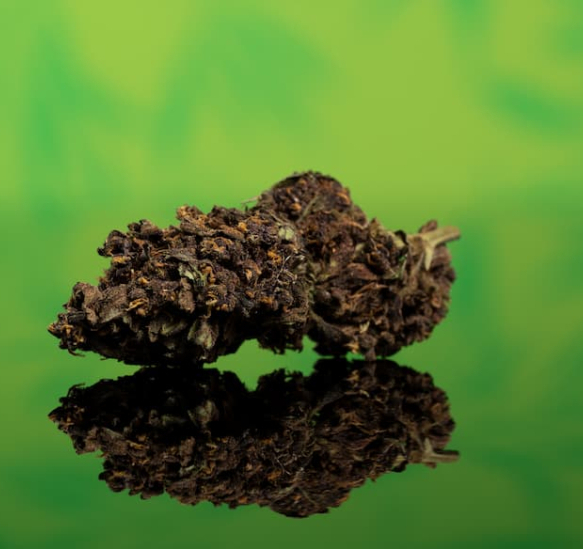
What is CBD ?
Cannabidiol, or CBD, is a cannabinoid naturally present in the hemp plant.
Contrary to THC, the psychotropic molecule in cannabis, CBD is neither psychoactive nor addictive. In fact, that's why it was legalized by European decree and quickly found its place in the wellness and relaxation industry.
Available in a fine variety of formats (flowers, oils, resins, concentrates, e-liquids, edibles), CBD shines through its many greenesses, both for the body and the mind:
-
Soothing and relaxing effects, to neutralise stress and anxiety.
-
anti-inflammatory properties, particularly in the skin, muscles and joints.
-
antalgic properties, to relieve mild to moderate pain.
-
An antioxidant action, to eliminate free radicals, responsible for premature ageing.
More than just a relaxation molecule, CBD is a genuine CATALYST of well-being, natural and organic, which improves your quality of life on a daily basis. Do you have questions about cannabidiol and cannabinoids? We've compiled the answers from our experts in this FAQ
⬇️
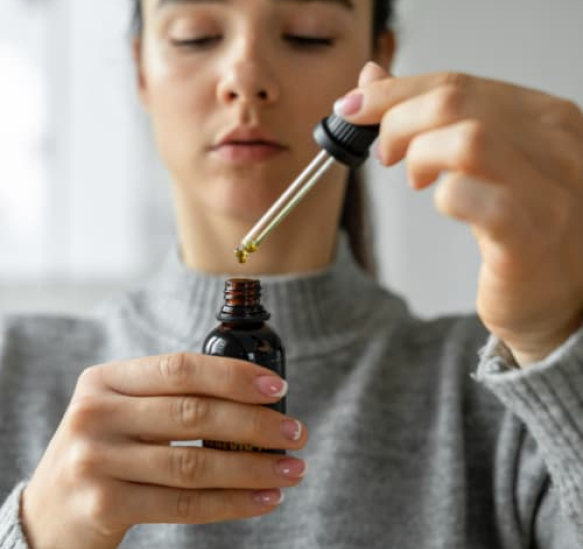
What are the effects of CBD ?
CBD is a molecule found in cannabis that has attracted growing interest within the medical community and the general public due to its beneficial properties.
Known primarily for its soothing effects, CBD has been acclaimed for its potential role in the treatment of a variety of ailments. Indeed, several studies have shown CBD to help reduce various types of pain, whether inflammatory, neuropathic or due to muscle tension.
In addition, it helps improve quality of sleep, offering deeper, restorative rest to those who need it.
Other than these benefits, CBD is also considered a natural alternative for managing and reducing stress and anxiety. Its anxiolytic properties enable the individual to regain a state of mental equilibrium.
In fact, some of our customers have found CBD an invaluable aid in moderating or even stopping their THC consumption, taking advantage of its effects without the psychotropic side.
However, although CBD has many benefits,it should be approached with caution, especially if you're on medication. Interactions between CBD and certain medications can influence the effectiveness of treatment or cause undesirable side effects.
Thus, before starting a CBD cure or incorporating it into your daily routine, it's imperative to consult a medical specialist. He or she will be able to assess possible interactions with the medications you are taking and give you an informed opinion on the appropriateness of your approach.
Looking for CBD for sleep? Discover our range of CBD flowers FOR SLEEP, our dedicated herbal teas and our best CBD oils for sleep. Discover our many varieties for a more restful sleep ...
Our CBD products to help in the fight against addiction. Cannabidiol is renowned for its positive effects against THC addiction.
Our range of CBD products to help you find sleep. Cannabidiol is known for its soothing and anti-insomnia effects.
All our CBD products to help soothe your aches and pains. For occasional or chronic pain, cannabidiol can bring you relief.
Do you have questions about CBD? Here are the most common questions
Is CBD a drug?
In Europe, the CBD trade is very much regulated.
Everything is done to avoid the negative effects of the THC molecule which can sometimes be found in the legal cannabis product.
The legal level of THC must not exceed 0.3% according to the latest decree published on 31.12.2021.
Any product containing more than the legal level of thc may be considered a drug in Europe and lead to a legal problem.
The online purchase of such a product should be avoided.
Howeverif the product respects this constraint and contains mostly cannabidiol, then it is not a drug and has none of the effects.
You can therefore consume cbd flowers, candy or cbd oils full spectrum,or any other product that respects this legal framework in Europe.
What are the benefits of CBD?
- CBD is a cannabinoid that acts on the "CB 1" and "CB 2" receptors of the endocannabinoid system, which is responsible for a number of physiological functions. When consumed with the correct dosage, CBD produces the following benefits:
- Soothing and relaxing effects, particularly for reducing or neutralizing stress and anxiety episodes;
- The calming effect also helps to combat insomnia and improve sleep quality for complete nights and productive days;
- Analgesic properties, to limit acute or chronic pain, with low to moderate intensity;
- Anti-inflammatory benefits, particularly for the skin (topical CBD), muscles, and joints, thus promoting muscle recovery in athletes;
- Antioxidant action, eliminating free radicals responsible for premature aging;
- CBD can also stimulate cognitive functions and boost motivation.
Is CBD legal in the UK?
Yes, CBD products that meet certain conditions can be freely marketed and consumed in the UK and much of neighboring Europe. Only CBD products with less than 0.3% THC are allowed. In the eyes of the legislator, this is the guarantee of products without psychotropic effects, insofar as THC is the psychoactive molecule that produces the "high" effect of cannabis.
Note: the sale and consumption of CBD is strictly forbidden to minors. It is also strongly discouraged for pregnant women. Also, it is forbidden to smoke cannabidiol. Consumers must therefore limit themselves to oral ingestion, vaping, infusion and local (or topical) applications.
What are the differences between THC and CBD?
Tetrahydrocannabinol, or THC, is a cannabinoid found naturally in the hemp plant. Its main difference with CBD lies in its psychoactive action. Indeed, this molecule is responsible for the "high" or "euphoric" effects associated with cannabis consumption, altering the state of consciousness and impacting memory, coordination and perception of time. It should also be noted that THC can cause relatively serious side effects such as anxiety, paranoia and tachycardia.
CBD, on the other hand, has no psychoactive effect and does not cause a feeling of euphoria. As such, it provides the consumer with the benefits of the hemp plant without the psychotropic and euphoric effects. This is why the legislator has set THC at a maximum level of 0.3%, i.e. at the level of mere traces.
Can I drive after taking CBD?
Our position is that you should not drive after consuming CBD, even if low doses do not impair your cognitive abilities or induce drowsiness. Caution is the better part of valour, especially for those who are just starting out and whose bodies are not yet accustomed to cannabidiol consumption.
Attention: the police do not look for CBD in the salivary tests... but THC is detectable. A priori, the legal limit of 0.3% of THC does not pose a problem in case of test, insofar as it is not enough to make it positive. On the other hand, if you buy from dubious suppliers who lack transparency on the real rate of THC of their products, you expose yourself to (very) heavy sanctions, within the framework of the fight against the traffic of narcotics. So be very careful. More info on our blog article "What are the risks of CBD in case of police control?"
The CBD flower, what is it?
It is simply the flowering part of the hemp plant, grown from specific varieties of the cannabis plant (Cannabis L. Sativa or Cannabis Indica). It has a high concentration of CBD and a very low THC content... which makes it a finished, semi-finished or raw material of choice to manufacture various CBD products such as oils, creams, e-liquids, foods, etc.
Sometimes referred to as "bud" or "hemp head", the CBD flower also concentrates trichomes, resinous glands that contain the useful cannabinoids of the hemp plant (CBD, but also CBC, CBN, CBG...), terpenes and flavonoids.
Given its high concentration of cannabinoids, its versatility (can be consumed in vaporization, infusion, seasoning of dishes ...) and the wide variety of strains offered, the CBD flower is the cannabidiol product most popular with consumers.
What is CBD oil?
CBD oil is a cannabidiol (CBD) product extracted from the cannabis plant, usually from the Cannabis L. Sativa or Cannabis Indica varieties, which contains high levels of CBD and very low or no levels of tetrahydrocannabinol (THC).
CBD oil is made by extracting cannabidiol, cannabinoids (CBG, CBN, CBC...) and other active compounds such as terpenes and flavonoids from the flowers, leaves and sometimes the stems of the hemp plant. The CBD extract is then mixed with a carrier oil, such as coconut oil, olive oil or hemp seed oil, to facilitate the use and absorption of the active ingredients.
CBD oil can take three forms, depending on its composition:
- Full spectrum CBD oil, containing all the natural components of the hemp plant, except THC ;
- Broad spectrum CBD oil, containing a good part of the natural components of the hemp plant (without THC);
- CBD isolate, which contains only cannabidiol.
Note: full spectrum CBD oil allows the body to benefit from the "entourage effect". Specifically, the soothing, analgesic and anti-inflammatory effects of CBD would be increased tenfold when the user ingests or applies a full spectrum product. For more info on dosage, see our article.
How to consume CBD?
Depending on the product, the purpose and the preferences of the user, CBD can be consumed in different ways:
- Sublingual consumption, particularly with CBD oils and tinctures. This involves placing the product under the tongue and allowing a few seconds for the sublingual mucosa to absorb it. This mode of consumption allows a fast and direct absorption of CBD in the bloodstream, for almost immediate effects and a better bioavailability compared to the oral consumption;
- Oral consumption: discreet and more "intuitive", oral consumption involves edible products (chocolates, candies, gum, energy drinks ...), capsules, tablets and CBD infusions (herbal teas, decoctions, cold drinks, etc.).
- Inhalation, via electronic cigarette or vaporizer: this mode of consumption concerns the e-liquids of vapotage and the flowers of CBD. Contrary to the fact of smoking CBD, the vaporization spares the consumer the inhalation of toxic and carcinogenic substances, insofar as one does not reach the combustion;
- Topical application, including creams, lotions, balms, ointments and gels of CBD;
- Transdermal administration of CBD, via cannabidiol patches.
Which CBD product to choose?
To choose the right CBD product, you will need to consider several factors based on your needs and organoleptic preferences. Summary:
- Purpose and/or symptoms: pain and inflammation call instead for topical products for targeted action, or oils and capsules for generalized relief. Oils and flower infusions are indicated for sleep problems, while skin problems respond well to topical products;
- Method of consumption: for quick action, favor products that can be consumed sublingually, especially oils. For longer lasting effects that diffuse gradually, opt for capsules, tablets, edibles and flowers. For local, targeted application, opt for topical CBD products;
- CBD concentration: start with a small dose, such as 5 mg per shot, and increase over the weeks until you feel the desired effects. We recommend the appropriate doses in our product sheets;
- Spectrum: full spectrum CBD products and, to a lesser extent, broad spectrum, allow you to benefit from the "entourage effect", which increases the effects felt tenfold;
- Quality and transparency: CBD products extracted with CO2 to ethanol are of better quality.
By taking these factors into account, you should be able to select a CBD product tailored to your specific needs from our online store.
What are the effects of CBD?
CBD is generally recognised by the general public and some scientific studies for various virtues:
- Helps regulate the immune system
- Has a possible anti-inflammatory effect on our body
- Has a possible positive influence in tests to treat epilepsy
- Has a positive effect in channeling a disease like multiple sclerosis
- Helps soothe pain
- Helps to moisturize dry skin, if used as a balm
- Helps cure tinnitus
- May have a positive effect on autism in children
- Helps treat rosacea
Our types of CBD do not give a cerebral high. Indeed, Lemon Haze resin is not a psychotropic drug like hashish could be for example. Besides, cannabidiol does not come from sativa cannabis varieties but rather from indica. Finally, it should be noted that there are also some secondary repercussions, depending on individual sensitivities. Consuming our products, in high doses and especially during specific treatments, can cause nausea and vomiting, but also in some cases a loss of appetite as well as a renewed appetite. In other, rarer cases, hallucinations due to excessive consumption may occur.
It should be noted that the effects also depend on how the molecule is administered. Oils, for example, provide a faster action by sublingual administration, compared to ingestion during a meal.
Finally, there is a gustatory pleasure derived from the flavours of each variety consumed.
The most passionate and experienced consumers like to spot citrus notes for example, or woody notes. However, not all consumers have a delicate palate, and it will take some practice to really spot all the flavours like an oenologist tasting a fine wine.
What are the different types of CBD products available?
- E-liquids: Used in electronic cigarettes, they allow you to vape CBD.
- Flowers: They are dried and can be consumed in different ways, including infusion or vaporization.
- Resins: These are CBD concentrates that can be vaporized or used in cooking.
- Oils: Used under the tongue for rapid absorption, they can also be added to foods.
- Capsules: These are capsules containing CBD oil for precise and convenient dosing.
- Wax: This is a concentrated form of CBD for vaporization or dabbing.
- Crystals: These are CBD in its purest state that can be used sublingually or to enhance other CBD products.
- Food products: Tea, honey, chocolate, etc., are gourmet ways to integrate CBD into food.
- Products for animals: These are specially formulated for the needs of pets.
What are the side effects and contraindications of CBD?
Side effects of CBD may include drowsiness, dry mouth, headaches or gastrointestinal upset. Contraindications mainly concern pregnant or breastfeeding women, people under 18, people with pre-existing medical conditions or under medication, who should consult a healthcare professional before consumption.
Where can I buy quality CBD?
To buy quality CBD, opt for reputable specialist stores like 321CBD, which offer tested and certified products, with transparency on the origin and extraction methods used. What's more, we guarantee fast, secure and discreet delivery on every order.
What's the best CBD format to use?
The "best" CBD format depends on your individual needs and preferences. Oil is versatile and fast-acting, capsules offer precise dosages, while flowers and e-liquids are suitable for those who prefer to inhale the product.
When is the best time to use CBD?
This varies according to the individual and the desired effect. Mornings can help to start the day calmly, while evenings can facilitate relaxation and sleep. It's advisable to start with small doses to see how your body reacts.
What's the difference between CBD and cannabis?
CBD (cannabidiol) is a non-psychoactive compound found in cannabis, while the term "cannabis" refers to the whole plant or products made from it, often associated with THC, the psychoactive compound that causes euphoric effects.
How does CBD interact with the body?
CBD interacts with the endocannabinoid system (ECS), a complex network of receptors found throughout the body. The ECS plays a role in many functions, such as pain, mood, appetite and sleep. CBD can influence these receptors and help regulate the body's equilibrium without the undesirable effects associated with THC.
How long does CBD remain in the system?
The length of time CBD remains in the system varies according to several factors, such as the amount consumed, frequency of use, the individual's metabolism and method of consumption. Typically, CBD can remain in the system for 2-5 days for an occasional user, but this can be longer for regular use.
Can CBD be taken with other medications?
Consult a healthcare professional before taking CBD with other medications. CBD can interact with certain medications by influencing the way your body metabolizes them, which can alter their effectiveness or increase the risk of side effects.
How is CBD extracted?
CBD extraction methods include supercritical CO2, ethanol and oil extraction. The CO2 extraction method is the most advanced and safest, providing a pure extract with no solvent residues.
🎉 BLACK WEEKS PROMOTION: 60% off selected CBD products until 02 December at 12 noon!
🎉 We’re extending the Black Weeks!
Enjoy 60% OFF on a wide selection of products: Flowers, Resins, Capsules, Crystals, Pet CBD, Chanvreo & Nerobi Oils and CBD Concentrates.
The discount is applied automatically as soon as an eligible product is added to your cart.
📅 Offer valid from November 13, 2025 at 11:30 a.m. to December 2, 2025 at 12:00 p.m.
You can also refer friends and use your loyalty rewards during the promotion.
⚠️ Offer cannot be combined with other promo codes or benefits.


